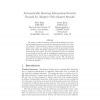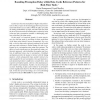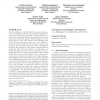365 search results - page 10 / 73 » Semi-automatic derivation of timing models for WCET analysis |
94
Voted
JCS
2011
14 years 6 months ago
2011
We present a model of adaptive attacks which we combine with information-theoretic metrics to quantify the information revealed to an adaptive adversary. This enables us to expres...
151
click to vote
ECRTS
2010
IEEE
15 years 25 days ago
2010
IEEE
Embedded control systems with hard real-time constraints require that deadlines are met at all times or the system may malfunction with potentially catastrophic consequences. Sched...
111
click to vote
WEBI
2010
Springer
14 years 9 months ago
2010
Springer
While much research has been performed on query logs collected for major Web search engines, query log analysis to enhance search on smaller and more focused collections has attrac...
119
click to vote
RTAS
2006
IEEE
15 years 5 months ago
2006
IEEE
Caches have become invaluable for higher-end architectures to hide, in part, the increasing gap between processor speed and memory access times. While the effect of caches on timi...
86
Voted
CASES
2009
ACM
15 years 6 months ago
2009
ACM
Accurate estimation of the tick length of a synchronous program is essential for efficient and predictable implementations that are devoid of timing faults. The techniques to dete...



